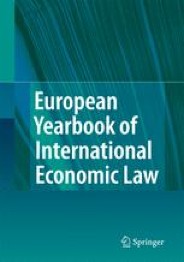Views
Regulating International Organisations: What Role for Private International Law?
Written by Dr Rishi Gulati, LSE Fellow in Law, London School of Economics; Barrister, Victorian Bar, Australia
The regulation of public international organisations (IOs) has been brought into sharp focus following the landmark US Supreme Court ruling in Jam v International Finance Corporation586 US (2019) (Jam). Jam is remarkable because the virtually absolute immunities enjoyed by some important IOs have now been limited in the US (where several IOs are based), giving some hope that access to justice for the victims of institutional action may finally become a reality. Jam has no doubt reinvigorated the debate about the regulation of IOs. This post calls for private international law to play its part in that broader debate. After briefly setting out the decision in Jam, a call for a greater role for private international law in the governance of IOs is made. Read more
Viewing the “Arrangement Concerning Mutual Assistance in Court-ordered Interim Measures in Aid of Arbitral Proceedings by the Courts of the Mainland and of the Hong Kong Special Administrative Region” as a Window onto the New Legal Hubs
Written by Matthew S. Erie, Associate Professor of Modern Chinese Studies and Fellow at St. Cross College, University of Oxford
On April 2, 2019, the Government of the Hong Kong Special Administrative Region (“HKSAR”) and the Supreme People’s Court of the People’s Republic of China” (“Supreme People’s Court”) signed an Arrangement Concerning Mutual Assistance in Court-ordered Interim Measures in Aid of Arbitral Proceedings by the Courts of the Mainland and of the HKSAR (hereinafter, “the Arrangement Concerning Mutual Assistance,” see English translation here). This is a momentous development in the growth of international commercial arbitration in both mainland China (also, the “PRC”) and Hong Kong as it is the first time that such a mechanism has been put in place to allow Chinese courts to render interim relief to support arbitrations seated outside of the PRC. Read more
Interpreting Forum Selection Clauses
Written by John Coyle, the Reef C. Ivey II Term Professor of Law, Associate Professor of Law at the University of North Carolina School of Law
Last week, I wrote about the interpretive rules that U.S. courts use to construe ambiguous choice-of-law clauses. Choice-of-law clauses are not, however, the only means by which contracting parties may exercise their autonomy under the rules of private international law. Parties may also select via contract the forum in which their disputes will be resolved. In the United States, these contractual provisions are generally known as forum selection clauses. Elsewhere in the world, such provisions are generally known as choice-of-court clauses. Since this post is largely focused on U.S. practice, I utilize the former term. Read more
News
Book Launch: Governance of Artificial Intelligence in the European Union What Place for Consumer Protection?
Marion Ho-Dac (Artois University) and Cécile Pellegrini (Lyon Catholic University) are hosting a conference at Lyon Catholic University on Friday 29 September 2023 on the occasion of the launch of their book “Governance of Artificial Intelligence in the European Union What Place for Consumer Protection?”.
The book tackles the interplay between Artificial Intelligence (AI) governance and consumer protection on the European Union (EU) market. An in-depth analysis of the existing and future EU legal framework is conducted in order to assess its capacity to meet the challenges posed by AI. The effectiveness of consumer rights, and more widely of fundamental rights, in the digital single market calls for a regulatory ecosystem that fosters trust and therefore, upstream, transparency and explainability of AI systems. Hence, the book explores different normative paths – from hard law to standardization – as well as monitoring and supervision tools – from ethics to media literacy – that could progressively lead to an inclusive and comprehensive EU governance structure for AI. Several book’s chapters highlight the complexity of balancing conflicting interests such as the protection of consumers against the adverse impacts of AI, supporting AI development and technological innovation and putting AI at the service of empowered consumers. Ultimately, the book offers important insights into thinking about tomorrow’s digital consumer in EU law, inviting a rethinking of European policy boundaries and related legal regimes.
The full programme for the event can be found here.
Praxis des Internationalen Privat- und Verfahrensrechts (IPRax) 5/2023: Abstracts
The latest issue of the „Praxis des Internationalen Privat- und Verfahrensrechts“ (IPRax) features the following articles:
(These abstracts can also be found at the IPRax-website under the following link: https://www.iprax.de/en/contents/)
European Yearbook of International Economic Law 2024: Call for abstracts (and papers)
 The editors of the European Yearbook of International Economic Law (EYIEL) welcome abstracts from scholars and practitioners at all stages of their career for the EYIL 2024. This year’s Focus Section will concentrate on International and European Economic Law – Moving Towards Integration? In the General Section, the EYIEL will address Current Challenges, Developments and Events in European and International Economic Law.
The editors of the European Yearbook of International Economic Law (EYIEL) welcome abstracts from scholars and practitioners at all stages of their career for the EYIL 2024. This year’s Focus Section will concentrate on International and European Economic Law – Moving Towards Integration? In the General Section, the EYIEL will address Current Challenges, Developments and Events in European and International Economic Law.


